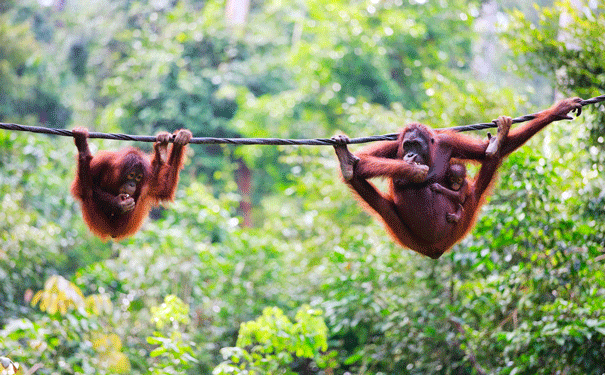
An orangutan family from Sabah, Borneo. BlueOrange Studio/Shutterstock
Parkour techniques help us better understand the swaying strategies of certain primates.
Swinging through trees appears to be the way to go if you’re an orangutan. These primates are much larger than other tree-dwellers, but they still prefer to stay off the ground. And according to researchers from the UK, this strategy actually helps them save energy.
The research team, led by Dr Lewis Halsey from the University of Roehampton, have examined the jumping and swaying strategies of the primates and how much energy each strategy uses. But instead of using real orangutans, they recruited human parkour athletes fitted with oxygen masks as substitutes.
“Because primates are not easy to work with, estimates of energy expenditure have been very indirect,” Halsey says. “We have gone a step closer to understanding these costs by measuring energy expenditure in a model primate — the parkour athlete.”
With the masks measuring their oxygen consumption, the athletes swung and jumped their way across the obstacle courses designed by Halsey’s team. During one precarious test, the athletes used a tall, flexible pole to mimic the tree-swaying manoeuvre that orangutans use to cross the gaps, swaying back and forth on the tree until they can reach the next one.
This strategy turned out to be extremely efficient, using one tenth of the energy that it would cost to climb down the tree and back up the next. “Energy expenditure could be a key constraint for orangutans ““ moving through trees could be energetically expensive.”
Jumping is another strategy used, but is only applied with the trees are stiff enough to jump easily and not use too much energy. “Heavier orangutans don’t jump, and we may have an explanation why,” Halsey says.
Everything they do is geared towards being as energy efficient as possible and allowing them to get by on a low-energy diet of fruit. In Sumatra, climbing down just isn’t an option, as there are predators on the forest floor, according to Dr Sam Coward from the University of Birmingham.
The results, which were presented at the Society for Experimental Biology’s meeting in Salzburg, Austria, could help predict how orangutans will be affected if their forest habitat is cut down and the gaps they encounter become larger. “If a gap becomes too large, they could find themselves isolated in one area of forest,” Coward told the BBC.
Source: Eureka Alert, BBC Nature






